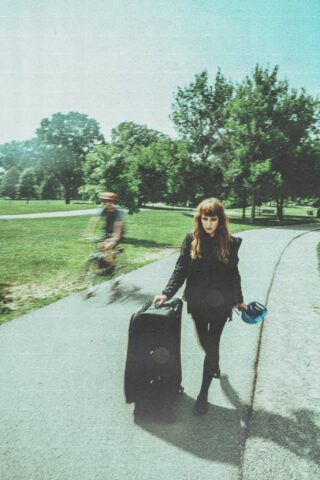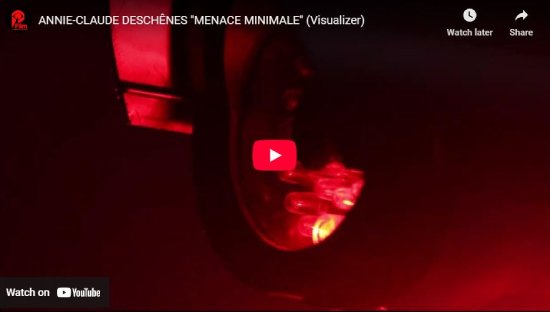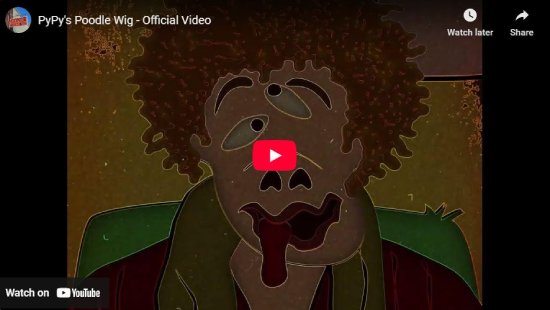
Photo: Alice Hirsch
Something intense happens to Annie-Claude Deschênes when she’s onstage. The Montréal-based singer-songwriter and visual artist falls into a kind of trance… one that sometimes becomes uncontrollable. “When that happens, I lose track of what’s happening, I no longer have control over anything,” she readily admits.
Deschênes has broken ribs while playing live with Duchess Says, an electro-punk outifit in which she shone brightly in the 2000s and 2010s. More recently, during a solo live performance during the avant-garde L’internationale périphérique festival in L’Anse-Saint-Jean, she split her head open.
“I felt this kind of intensity inside me, because I was going through a rather severe period in my life, and everything just kinda burst out,” she says. “I hit a vein on a sensitive area of my head with the mic, and blood started spurting out all over the place. It was everywhere, I’d never seen so much blood in my life! People were handing me facecloths to try and stop the bleeding. I applied pressure and that made me dizzy… Since the concept of my show was a cooking [hot] show, people were asking me if it was a trick, but it wasn’t at all!” she recalls, adding that she has no scars from the bloodbath; she didn’t even need stitches.
Deschênes had actually calmed down with her solo, minimalist, electro-pop project, compared to the edgy, punkier sound of her previous band, which she founded in 2003. “It might sound cliché, but old habits die hard,” she says.
Deschênes owns those old habits, and she’s comfortable with them. Even early on, when she started taking piano lessons, she could feel it didn’t quite sit well with her. “It gave me solid musical foundations, but I thought it was traumatizing,” she says. “My classes were in a convent, and it was an ultra-strict environment. It took everything out of me to go there.”
It was during her teens that she discovered her voice as an instrument. “I started singing – or rather, screaming – at 16!,” she says. “I had a lot to get off my chest, a lot of emotions to let out. I was trying to channel all of that. My psychotherapist once told me I could’ve easily ended up homeless, with everything I lived through. My way out was music. It’s all been very introspective, since day one.”
After a stint in a cover band where she learned songs by The Velvet Underground, The Pixies and… Joe Dassin(!), Deschênes founded what would later become Duchess Says. Full of ambition, she left her homtown of Lévis to study sound design in Montréal. “I wanted to find my place, and I felt like the studio wasn’t the place to express what I wanted to,” he says. “It was increasingly hard for me. I enrolled at Musitechnic to learn how to verbalize what I felt inside.”
Nothing stood in the way of the singer, who back then was doing everything she could to keep learning about her future craft. She’d go on road trips to New York and elsewhere to see some of her musical heroes, like Sonic Youth and John Cale. “I’d go talk to them after the show, and give them demos on cassette,” she says. “They would often enourage me and share advice or even play one of my songs in their DJ sets. Music was my obsession. I knew that’s what I wanted to do in life, but finding out how to make that happen wasn’t obvious. I was obsessed by the idea of understanding everything.”
Duchess Says was one of the most exciting bands on Montréal’s alternative music scene throughout 2000 to 2010. Their reach extended internationally, especially in Europe and the U.S., where they toured extensively. “And then one night in New York, Nick Zinner (from The Yeah Yeah Yeahs) was there. He asked our manager if we’d be interested in opening for his band!” she recalls. “It clicked instantly with them. [Lead singer-songwriter] Karen O and I would talk about everything and nothing. It felt like we were cousins.”
The Duchess Says effect is powerful, and Deschênes’ well understands her charisma and exuberance. “I wanted things to be as raw as possible,” she says. “I wore no make-up and no costumes. I didn’t want people to look at me, or think I’m sexy. I wanted people to focus on the artistic performance.”
But this very strict way of embracing the stage eventually wore the singer down, and by the mid-2010s, another band would answer her desire to break the mold: PyPy. Made up of three members of Duchess Says, along with Roy Vucino (Red Mass, CPC Gangbangs), the band offered up a more classic/psychedelic rock universe, though still heavily influenced by punk.
“That heavy rock was quite the opposite of my style, but we acted out so much that it became funny,” says Deschênes. “I mean, we can all agree Duchess Says is a pretty intense proposition. People expected certain things from me, but I hate repeating myself. I realized that in trying to break out of the mold, I always ended up in another mold. With PyPy, it was almost entirely the same people and the same crowd, but I no longer felt any pressure.”
And so it went with her solo career, which was also inspired by the irresistible desire to break the mold. “I found it really hard, during the pandemic, to wait for my band, for everyone to be ready to make music,” she says. “I like when things are moving, I have so many projects to release, and things weren’t moving fast enough for me.”
Initially focused on music, visual arts, and performance, the multi-disciplinary artist’s solo project has sharpened its focus since the release of the album Les manières de table last year. “I’ve set aside the performance side a bit, and moved away from the visual arts. I’ve realized I really like focusing on the music,” she says.
In the Fall of 2025, she’ll be playing several shows in Québec and Europe, including Pop Montréal on Sept. 25; Hamburg, for the Reeperbahn Festival, as part of M for Montréal’s On The Road missions; before heading out on a European tour with stops in Brussels, Strasbourg, Lyon, Luxembourg, and Paris. She’ll then return to Canada for dates in Toronto and across Québec. “It’s so DIY that it re-connects me to my roots,” she says.
Let’s just hope that this re-connection doesn’t always require a bloodletting.

